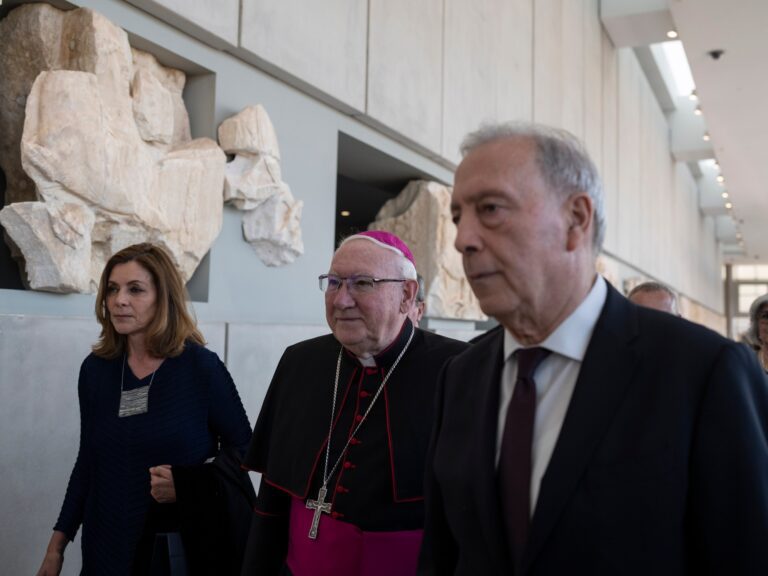The return of objects from the Vatican’s Parthenon increases pressure on the British Museum to respond to a campaign launched by Athens 40 years ago.
Greece has welcomed the Vatican’s return of ancient artifacts from the Acropolis, continuing its campaign to put pressure on the British Museum to restore a collection of sculptures from the ancient site of Athens more than 200 years ago.
Greek Culture Minister Lina Mendoni on Friday chaired a ceremony to repatriate three fragments of sculptures kept in the Vatican Museums.
The objects, representing a horse and two male heads, will be added to the collection of the Acropolis Museum, opened in 2009 at the foot of the ancient site in the center of the Greek capital, Athens.
Bishop Brian Farrell, the Vatican secretary for promoting Christian unity, led the visiting delegation and said the return of the three fragments had been discussed. during a visit to Athens by Pope Francis in 2021.
“The donation of the fragments of the Parthenon, preserved in the Vatican Museums for more than two centuries, presents itself as a cultural and social gesture of friendship and solidarity with the Greek people,” Farrell said.
“We assure you of our intimate joy at the realization of your legitimate wish to possess the (…) fragments at home in their place of origin,” he added.
The move increased pressure on the British Museum to reach an agreement with Greece, following a campaign launched by Athens 40 years ago.
“Initiatives like these show the way forward, how the pieces of the Parthenon can be brought together, healing the wounds caused by barbarian hands so many years ago,” Mendoni said.
“This brings us to the just and moral demand of the entire Greek people, as well as of this government and its Prime Minister, for the definitive return of all the sculptures of the Parthenon.”
Mendoni said Greece would be willing to lend the British Museum ancient Greek objects for display to “fill the gap” if the marbles were returned.
“Greece cannot recognize the possession and ownership of the British Museum because it considers the sculptures there to be flight product,” she says.
The head of the Greek Orthodox Church, Archbishop Ieronymos II, said that “the act of Pope Francis is of historical importance and has a positive impact at all levels. We hope this will serve as an example to others.
Greek Culture Ministry officials have played down remarks made last month by British Museum president George Osborne, who said the UK was working with Greece on an arrangement to display the Parthenon marbles in London and in Athens.
Last year, another marble sculptural fragment from the Parthenon temple – depicting a foot of the ancient Greek goddess Artemis – was returned to Athens from a museum in Palermo, Sicily.
Greece says the Parthenon sculptures are central to its ancient heritage, while supporters of the British Museum argue their return could damage museum collections and cultural diversity globally.
Carved in the 5th century BC, the Parthenon sculptures were taken in the early 19th century by British diplomat Lord Elgin before Greece gained independence from the Ottoman Empire.


